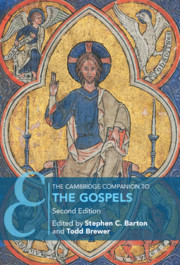Book contents
- The Cambridge Companion to the Gospels
- Cambridge Companions to Religion
- The Cambridge Companion to the Gospels
- Copyright page
- Contents
- Figures
- Contributors
- Abbreviations
- Introduction
- Part I Approaching the Gospels
- 1 What Is a Gospel?
- 2 The Fourfold Gospel
- 3 Gospel Sources and Interrelations
- 4 The Scriptural Matrix of the Gospels
- 5 The Gospels and ‘the Historical Jesus’
- 6 The Gospels and the Reader
- Part II The Gospels As Witnesses to Christ
- Part III The Afterlife of the Gospels
- Index
- Cambridge Companions to Religion (continued from page iii)
- References
1 - What Is a Gospel?
from Part I - Approaching the Gospels
Published online by Cambridge University Press: 10 August 2021
- The Cambridge Companion to the Gospels
- Cambridge Companions to Religion
- The Cambridge Companion to the Gospels
- Copyright page
- Contents
- Figures
- Contributors
- Abbreviations
- Introduction
- Part I Approaching the Gospels
- 1 What Is a Gospel?
- 2 The Fourfold Gospel
- 3 Gospel Sources and Interrelations
- 4 The Scriptural Matrix of the Gospels
- 5 The Gospels and ‘the Historical Jesus’
- 6 The Gospels and the Reader
- Part II The Gospels As Witnesses to Christ
- Part III The Afterlife of the Gospels
- Index
- Cambridge Companions to Religion (continued from page iii)
- References
Summary
Identifies some of the defining characteristics of the gospel genre by comparing them with other genres such as folk tales, memoirs, biographies, scriptural narratives and martyrologies. The analysis leads to the significant conclusion that the gospels are in some sense sui generis – written versions of early Christian teaching and preaching about Jesus.
- Type
- Chapter
- Information
- The Cambridge Companion to the Gospels , pp. 9 - 28Publisher: Cambridge University PressPrint publication year: 2021
References
Further Reading
- 1
- Cited by

